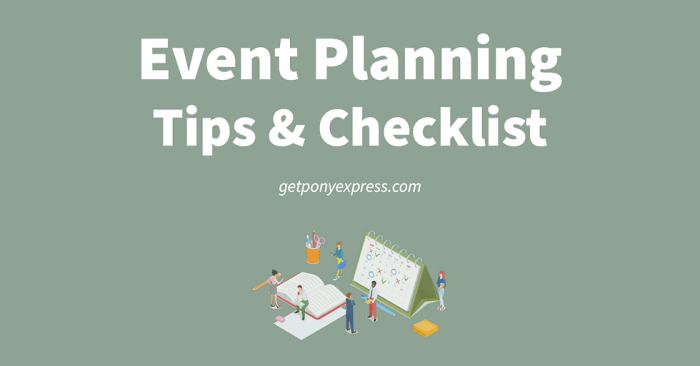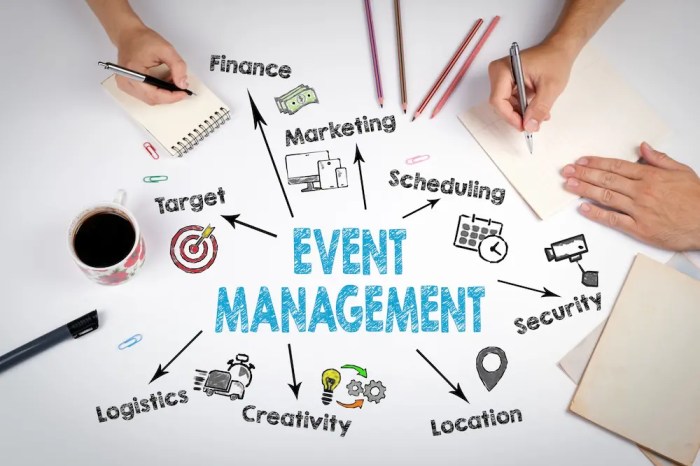Event Planning Tips takes center stage as we dive into the world of crafting unforgettable events. Get ready to master the art of event planning with these expert insights and strategies.
From setting clear objectives to selecting the perfect venue, this guide will equip you with the knowledge to ensure every event is a seamless success.
Importance of Event Planning: Event Planning Tips

Planning an event is crucial for its success as it sets the foundation for a seamless and unforgettable experience for attendees. Effective event planning ensures that all aspects of the event are well-organized and executed, leading to a positive outcome.
Increased Attendance
- By strategically planning an event, organizers can effectively promote it through various channels, resulting in increased attendance.
- Proper planning allows for targeted marketing efforts to reach the desired audience, maximizing the event’s reach and impact.
- Well-planned events tend to attract more attendees due to the compelling program and seamless execution.
Enhanced Guest Experience
- Event planning plays a crucial role in creating a memorable experience for guests by ensuring smooth logistics and thoughtful details.
- From registration processes to seating arrangements and entertainment options, every aspect is carefully planned to enhance the guest experience.
- Effective event planning anticipates the needs and preferences of attendees, making them feel valued and cared for throughout the event.
Overall Success of the Event
- Successful event planning is the key to the overall success of an event, from start to finish.
- It involves meticulous coordination of all elements, including venue selection, catering, entertainment, and logistics, to ensure a flawless execution.
- Well-planned events leave a lasting impression on attendees, leading to positive feedback, increased brand reputation, and potential future opportunities.
Steps in Event Planning Process
Planning an event involves several key steps that are crucial for its success from start to finish. Setting clear objectives and goals at the beginning of the planning process is essential to ensure that all efforts are aligned with the desired outcomes. Budgeting, venue selection, and vendor management also play a significant role in the overall event planning process.
Setting Clear Objectives and Goals
Setting clear objectives and goals at the beginning of the event planning process is crucial for ensuring that all decisions and actions are focused on achieving the desired outcomes. By clearly defining what you hope to achieve with the event, you can effectively plan the logistics, budget, and resources needed to make it a success.
Budgeting, Event Planning Tips
Effective budgeting is key to the success of any event. By carefully planning and allocating resources, you can ensure that the event stays within budget while still meeting the desired objectives. It is important to consider all expenses, including venue rental, catering, decorations, and entertainment, to avoid any unexpected costs that may arise during the planning process.
Venue Selection
Choosing the right venue for your event is crucial to its overall success. The venue should align with the event objectives, accommodate the expected number of guests, and provide the necessary facilities and amenities. Factors such as location, accessibility, and ambiance should be carefully considered when selecting a venue for your event.
Vendor Management
Managing vendors effectively is essential for ensuring that all aspects of the event run smoothly. From catering services to entertainment providers, coordinating with vendors and ensuring clear communication is key to the success of the event. Establishing timelines, contracts, and expectations with vendors can help prevent any last-minute issues and ensure a seamless event experience for all involved.
Tips for Selecting the Right Venue

When it comes to event planning, choosing the right venue is crucial for the success of your event. The venue sets the tone and atmosphere, so it’s essential to pick one that aligns with your event’s theme and objectives. Here is a detailed guide on how to select the perfect venue for your next event.
Factors to Consider when Selecting a Venue
- Location: Choose a venue that is easily accessible for your guests. Consider proximity to public transportation, parking availability, and overall convenience.
- Capacity: Ensure that the venue can accommodate the number of guests you expect. It’s better to have a slightly larger space than to have guests feeling cramped.
- Amenities: Look for venues that offer the amenities you need, such as audiovisual equipment, catering services, and seating arrangements. Make sure the venue can provide everything necessary for your event.
- Accessibility: Consider the accessibility of the venue for all guests, including those with disabilities. Make sure the venue is wheelchair-friendly and has adequate facilities.
Negotiating Contracts and Finalizing Arrangements
- Discuss all details with the venue owner or manager before signing any contracts. Make sure you understand all costs, restrictions, and requirements.
- Negotiate the terms of the contract, including pricing, payment schedule, cancellation policies, and any additional services you may need.
- Get everything in writing to avoid any misunderstandings later on. Ensure that all arrangements, including setup, breakdown, and cleanup, are clearly Artikeld in the contract.
Creating Event Timelines
Creating a detailed event timeline is crucial for ensuring a well-coordinated and successful event. It helps in organizing the various tasks, activities, and schedules involved in the event day, making sure everything runs smoothly.
Structuring an Effective Event Timeline
- Setup: Start the timeline with the setup process, including arranging decorations, setting up equipment, and preparing the venue.
- Registration: Next, Artikel the registration process, such as check-in procedures, distributing badges, and welcoming attendees.
- Activities: Detail the timeline for the main activities of the event, including presentations, workshops, entertainment, and networking sessions.
- Teardown: Finally, include the teardown schedule for cleaning up the venue, packing equipment, and wrapping up the event.
Communicating the Event Timeline
- Vendor Coordination: Share the event timeline with vendors in advance to ensure they are aware of setup and breakdown times, as well as any specific requirements.
- Staff Briefing: Conduct a briefing session with staff to go over the event timeline, roles and responsibilities, and any important updates or changes.
- Participant Information: Communicate the event timeline with participants through event programs, digital platforms, or email reminders to help them plan their day effectively.